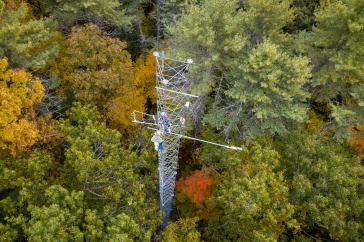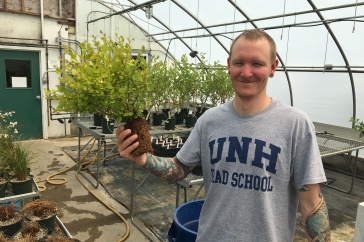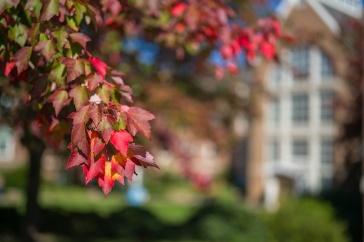In August, before vehicles loaded with dorm room essentials deliver more than 3,000 first-year students to UNH’s Durham campus, roughly two dozen new Wildcats arrive to begin a two-week Connect STEM course called Scientific Research Immersion. Taught by Kim Babbitt, dean of academic affairs at the College of Life Sciences and Agriculture, and Jennifer Purrenhage, senior lecturer in the department of natural resources and the environment, the course is an introduction to college-level scientific research and scholarship.
The students, who are part of a year-long Connect program for incoming students who are traditionally underrepresented in higher education, including those from multicultural, first-generation or low-income backgrounds, spend most of the time outdoors in College Woods and on campus farms discussing the environment and exploring humans’ relationships with nature. While there’s plenty of focus on scientific research and methodology, Babbitt and Purrenhage also make it a point to field students’ practical questions about college life, including how to address faculty and what they should expect once classes start.
Below, five students look back on their experience and the ways it continues to influence them months after the course has wrapped.

Isabella Solari ’22, biology and French dual major from Gorham, Maine
“I’ve never had teachers that go above and beyond. In only two weeks, I felt I learned more from Dean Babbitt and professor Purrenhage than I did in a whole year of high school. Dean Babbitt told us her office is always open, so if I need anything I know exactly where to go.”
Crismeily Borg ’22, nutrition major from Nashua, New Hampshire
“I loved the class. I learned so much – not just about the environment and our connection to nature, but I learned about myself, too. I learned that I don’t have to be shy all the time, how to communicate with people and what I’m capable of. Dean Babbitt has a great sense of humor and was really honest and open. You know that you could go to her for whatever you need. Professor Purrenhage was enthusiastic about everything; it made you feel like she was discovering things right along with us. It didn’t feel like a traditional professor-student dynamic. They both made you feel like we’re all in this together.”

Armani Alonso ’22, undeclared, from Lawrence, Massachusetts
“My experience with Dean Babbitt and professor Purrenhage made me more willing to reach out to my professors when I have questions. For example, before my first biology exam, I went to the professor and asked specific questions that I thought would be on the exam and I felt more comfortable doing so because I had spoken to a dean and another professor and learned they’re people just like us.”

Jasmin Wagner ’22, sustainable agriculture and food systems major from Tiverton, Rhode Island
“My experience with the course was amazing. It took every idea and every stereotype and every fear and concern that I had about being in that big 300-student lecture hall and it blew it completely out of the water. Professor Purrenhage and Dean Babbitt were very respectful of our ideas, helping to guide us in the right direction but not tell us what to do. To have that freedom was a little nerve-wracking at first, but it was also liberating to be so respected and supported. So it was completely different than anything I’d ever experienced, and I loved every minute of it.”

Alexa Beaule ’22, zoology major from Northfield, New Hampshire
“I knew I’d have trouble adjusting to the number of people here. Socially, the experience definitely made me more confident. When I found out a dean would be teaching the class, that seemed very intimidating but then we met Dean Babbitt and professor Purrenhage, and they were so nice. It was an amazing introduction to college and it let me know that I’m in the right place.”
-
Written By:
Sarah Schaier | College of Life Sciences and Agriculture


















































